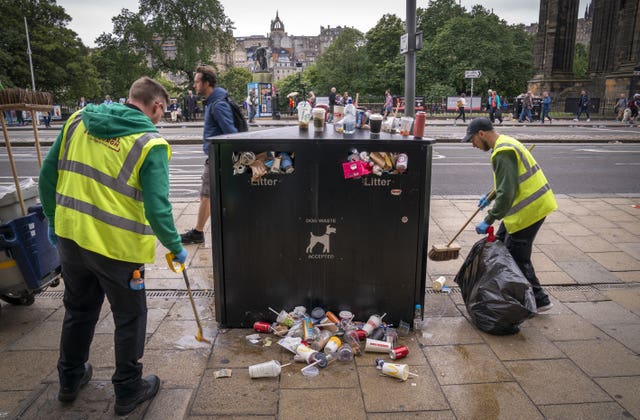
Scottish councils are set to meet unions in a bid to stop the spread of strikes which have left Edinburgh’s bins overflowing and its streets strewn with rubbish.
Waste workers walked out on Thursday in the capital in protest at a 3.5% pay rise offer unions blasted as “derisory” and “pathetic”, with the strike scheduled to last until August 30.
Already rubbish is piling up, with city centre streets covered in litter, bins overflowing in tourist hotspots and black bags rapidly piling up outside people’s homes.
Last week council umbrella body Cosla offered a 5% pay deal to workers, a move First Minister Nicola Sturgeon said on Monday she hoped would resolve the dispute.
“Nobody wants to see the kind of disruption and impact of strikes that many people are witnessing in Edinburgh right now,” she said.
Cammy Day, leader of the City of Edinburgh Council, said he believed “that our council colleagues have the right to be paid fairly”.
“I’m continuing to push hard for a resolution as quickly as possible,” he said.
“We also need to carry on pressing the Scottish Government to give us more flexibility on how we use our resources and as well as providing fairer funding for our services.”

Cosla is set to meet the unions on Tuesday, but the unions have warned there was “insignificant detail” in the proposals so far and said the strikes would continue as planned.
Alison Maclean, industrial officer at Unite, said: “Our members have taken the brave stance of taking strike action to get the pay rise they deserve and we are determined to ensure that this happens.”
If the dispute is not solved, the scenes which have met festival-goers in the capital could be replicated across Scotland, with Edinburgh scheduled as the first in a series of strikes north of the border.
Ms Maclean said the walk-outs would “continue as planned”, and added: “There remains insignificant detail on the 5% pay offer, and what this in reality means for the lowest paid workers.
“At this moment the offer from Cosla remains a vague aspirational pledge but Unite can’t take anything to our wider membership unless we have specifics and guarantees.”
And Kier Greenaway, GMB Scotland’s senior organiser, said union members wanted “clarity from Cosla about whether this proposal comes with the assurance of a flat rate award, a key demand of the union pay claim”.
“The prospect of the highest paid getting the biggest cash increases in any offer would be unacceptable, let alone one that is still well below inflation,” he said.
 Staff from Essential Edinburgh collect some of the litter from around the bins along Princes Street in Edinburgh (Jane Barlow/PA)
Staff from Essential Edinburgh collect some of the litter from around the bins along Princes Street in Edinburgh (Jane Barlow/PA)
Last month the Consumer Price Index inflation reached a new 40-year high of 10.1%, with some analysts having predicted the UK is on course to breach 18% at the start of 2023 due to skyrocketing energy bills.
Shopkeepers and members of the public in Edinburgh have been forced to tidy up the waste mountains left because of the strike.
Mr Day, who joined striking workers outside city chambers on Thursday, said: “I’d like to thank everyone for their patience as the strike continues and please continue to follow our advice on how to deal with your waste safely and responsibly to help us manage the impact of the strike action.”
The strikes are expected to hit 14 local authorities across Scotland, with workers set to walk out in areas including Glasgow, Aberdeen, Dundee, East Renfrewshire and West Lothian.
A Scottish Government spokeswoman said: “We urge local authority and union representatives to come to an agreement to resolve the dispute as soon as possible.
“The Scottish Government is treating councils fairly and providing a real terms increase of 6.3% to local authority budgets this year, as well as providing an extra £140 million of funding on a recurring basis to support a higher pay award for council staff.”



Why are you making commenting on The Herald only available to subscribers?
It should have been a safe space for informed debate, somewhere for readers to discuss issues around the biggest stories of the day, but all too often the below the line comments on most websites have become bogged down by off-topic discussions and abuse.
heraldscotland.com is tackling this problem by allowing only subscribers to comment.
We are doing this to improve the experience for our loyal readers and we believe it will reduce the ability of trolls and troublemakers, who occasionally find their way onto our site, to abuse our journalists and readers. We also hope it will help the comments section fulfil its promise as a part of Scotland's conversation with itself.
We are lucky at The Herald. We are read by an informed, educated readership who can add their knowledge and insights to our stories.
That is invaluable.
We are making the subscriber-only change to support our valued readers, who tell us they don't want the site cluttered up with irrelevant comments, untruths and abuse.
In the past, the journalist’s job was to collect and distribute information to the audience. Technology means that readers can shape a discussion. We look forward to hearing from you on heraldscotland.com
Comments & Moderation
Readers’ comments: You are personally liable for the content of any comments you upload to this website, so please act responsibly. We do not pre-moderate or monitor readers’ comments appearing on our websites, but we do post-moderate in response to complaints we receive or otherwise when a potential problem comes to our attention. You can make a complaint by using the ‘report this post’ link . We may then apply our discretion under the user terms to amend or delete comments.
Post moderation is undertaken full-time 9am-6pm on weekdays, and on a part-time basis outwith those hours.
Read the rules hereLast Updated:
Report this comment Cancel